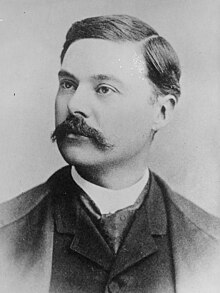Fred Dubois | |
|---|---|
 | |
| United States Senator from Idaho | |
| In office March 4, 1901 – March 3, 1907 | |
| Preceded by | George Shoup |
| Succeeded by | William Borah |
| In office March 4, 1891 – March 3, 1897 | |
| Preceded by | William McConnell |
| Succeeded by | Henry Heitfeld |
| Delegate to the U.S. House of Representatives from Idaho Territory | |
| In office March 4, 1887 – July 3, 1890 | |
| Preceded by | John Hailey |
| Succeeded by | Willis Sweet (as U.S. Representative) |
| Personal details | |
| Born | Fred Thomas Dubois May 29, 1851 Palestine, Illinois, U.S. |
| Died | February 14, 1930 (aged 78) Washington, D.C., U.S. |
| Resting place | Grove City Cemetery Blackfoot, Idaho |
| Political party | Republican (until 1896) Silver Republican (1896–1901) Democratic (after 1901) |
| Spouse(s) | Edna Maxfield Whited Dubois (1875–1931) (m. 1899–1930, his death)[1] |
| Children | 2 daughters |
| Parent(s) | Jesse Kilgore Dubois (1811–1876) Adelia Morris Dubois (1820–1886)[2] |
| Residence(s) | Blackfoot, Idaho Washington, D.C. |
| Alma mater | Yale College |
| Profession | Agriculture |
Fred Thomas Dubois (May 29, 1851 – February 14, 1930) was a controversial American politician from Idaho who served two terms in the United States Senate.[2] He was best known for his opposition to the gold standard and his efforts to disenfranchise Mormon voters.[3][4]
- ^ "Edna M. Dubois (1875-1931) - Biographical Sketch". Idaho State University. Eli M. Oboler Library. Archived from the original on March 5, 2016. Retrieved September 27, 2015.
- ^ a b "Fred T. Dubois - Biographical Sketch". Idaho State University. Eli M. Oboler Library. Archived from the original on September 10, 2015. Retrieved September 27, 2015.
- ^ "Death summons former Idahoan". Lewiston Morning Tribune. Idaho. Associated Press. February 15, 1930. p. 1.
- ^ Dubois, Fred T. (September 18, 1904). "United States Senator Fred T. Dubois, on the Mormon question". Spokesman-Review. Spokane, Washington. editorial. p. 1–part 3.